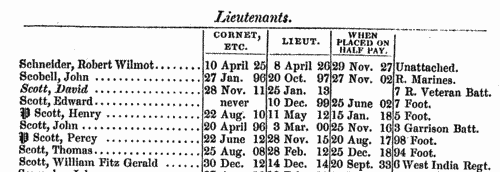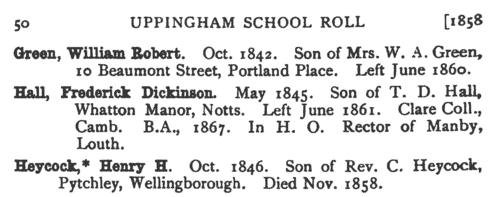Add this eBook to your basket to receive access to all 2,201 records. Our indexes include entries for the spelling freeman. In the period you have requested, we have the following 2,201 records (displaying 1,151 to 1,160): These sample scans are from the original record. You will get scans of the full pages or articles where the surname you searched for has been found. Your web browser may prevent the sample windows from opening; in this case please change your browser settings to allow pop-up windows from this site. Officers of the British Army on Foreign Half-Pay
(1840)
The New Annual Army List, corrected to 7 February 1840, was published in London by Lieut. H. G. Hart. The section entitled 'Officers on the Retired Full Pay and Half Pay' lists all such officers, by rank from captain down to ensign, with paymasters, adjutants, quarter-masters, medical staff and chaplains. (Officers above the rank of captain were retained in the main list of Field Officers). These lists are annotated with dates of successive ranks, when placed on half-pay, and the name of the regiment, &c., and with symbols indicating the officers present at Trafalgar (T), in the Peninsula or the South of France (P), and Waterloo (W). Names of officers on retired full-pay are given in italics. The list covers not only the regiments of the line, but also the Royal Artillery, Royal Engineers, Royal Marines, Staff, and Military Departments. | Sample scan, click to enlarge

| Petitioning Creditors and Solicitors
(1840)
Principal creditors petitioning to force a bankruptcy (but often close relatives of the bankrupt helping to protect his assets): and solicitors | Sample scan, click to enlarge

| Tenants and occupiers in Swanton Morley
(1840)
The register of electors entitled to vote in any parliamentary election for West Norfolk between 1 November 1840 and 1 November 1841 lists 7,620 freeholders arranged by hundred and within hundred by parish or township &c. In the first column, after number within the register, the elector's name is given (surname first); the second column gives place of abode; the third column the nature of qualification (such as 'owner and occupier'); and the fourth column the address of the qualifying property, in some cases with the name of the tenant or occupier. | Sample scan, click to enlarge

| Bankrupts
(1841)
Bankruptcy notices for England and Wales: bankruptcy often caused people to restart their lives elsewhere, so these are an important source for lost links
| Sample scan, click to enlarge

| Bankrupts' Assignees
(1841)
Assignees of bankrupts' estates (usually principal creditors and/or close relatives of the bankrupt) in England and Wales | Sample scan, click to enlarge

| Bankrupts' Assignees
(1841)
Assignees of bankrupts' estates (usually principal creditors and/or close relatives of the bankrupt) in England and Wales | Sample scan, click to enlarge

| Boys entering Uppingham School
(1841)
The public school at Uppingham in Rutland was founded by Archdeacon Johnson in 1584. A roll of scholars from 1824 to 1905 was edited by J. P. Graham, and published in 1906. This was a revision and updating of an 1894 edition of the roll, the great bulk of the work having been done by Mrs Mullins. The roll is arranged by year, and within each year by term of entrance, and then alphabetically by surname within each term. Each boy's name is given, surname first, with an asterisk where known (in 1906) to have died. Then there is month and year of birth, father's name (most often just surname and initials) and address (at entrance). Where the boy represented the school at Rugby football (XV) or cricket (XI), that is indicated. After the month and year of leaving the school, there is a brief summary of achievements in later life, and, where known, address as in 1906. | Sample scan, click to enlarge

| County Cork Freeholders: Booth No 1
(1841)
The poll books of voters in the parliamentary election for county Cork 13 to 15 July 1841 delivered in to the select committee that subsequently looked into the propriety of the proceedings, and then annotated with observations as to those votes to which objection had been raised. There are separate books for seven booths, with the electors' names in order of voting: giving each freeholder's full name, place of abode, situation of the freehold, value, number and date in the alphabetical registry book, and for which candidates they voted (Daniel O'Connell, Edmund Burke Roche, Nicholas Philpot Leader, and Robert Longfield). The seven booths are for these areas: 1. Duhallow barony; 2. Hall County Side, East East Carbery, West East Carbery and East West Carbery; 3. Barrymore and West West Carbery; 4. Condons and Fermoy; 5. Imokelly and West Muskerry. | Sample scan, click to enlarge

| County Cork Freeholders: Booth No 3
(1841)
The poll books of voters in the parliamentary election for county Cork 13 to 15 July 1841 delivered in to the select committee that subsequently looked into the propriety of the proceedings, and then annotated with observations as to those votes to which objection had been raised. There are separate books for seven booths, with the electors' names in order of voting: giving each freeholder's full name, place of abode, situation of the freehold, value, number and date in the alphabetical registry book, and for which candidates they voted (Daniel O'Connell, Edmund Burke Roche, Nicholas Philpot Leader, and Robert Longfield). The seven booths are for these areas: 1. Duhallow barony; 2. Hall County Side, East East Carbery, West East Carbery and East West Carbery; 3. Barrymore and West West Carbery; 4. Condons and Fermoy; 5. Imokelly and West Muskerry. | Sample scan, click to enlarge

| Dissolutions of Partnerships
(1841)
Trade partnerships dissolved, or the removal of one partner from a partnership of several traders, in England and Wales
| Sample scan, click to enlarge

|
Research your ancestry, family history, genealogy and one-name study by direct access to original records and archives indexed by surname.
|











